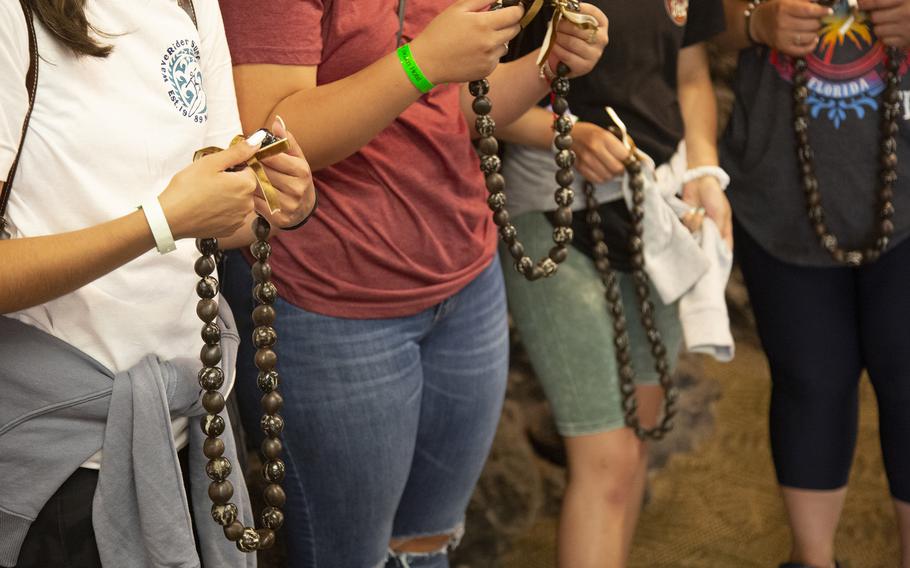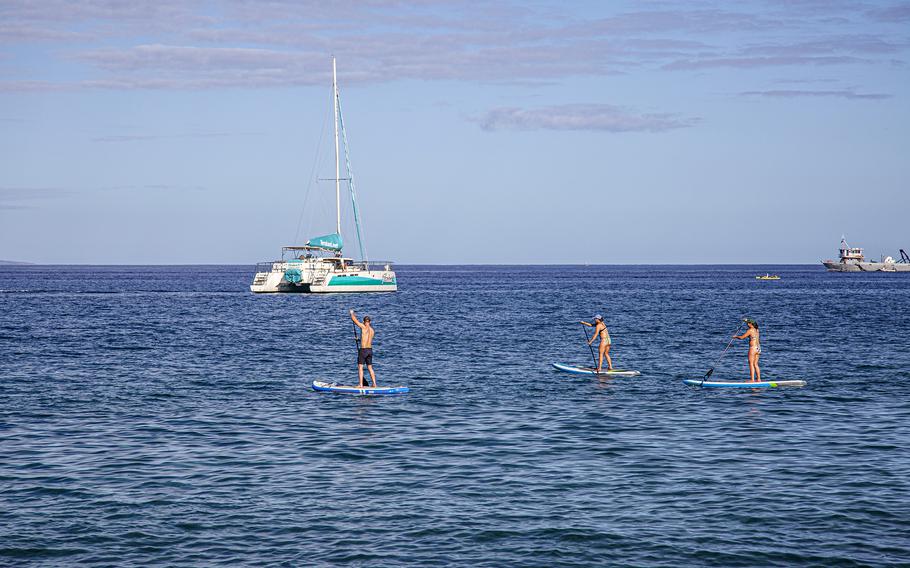
The Ka'anapali Beach Hotel departure kukui nut ceremony. (Ryan Siphers/The Washington Post)
Throughout the pandemic, American travelers have been drawn to Hawaii, despite the hurdles it took to get there. From March to October 2020, travelers had to undergo a 14-day quarantine to escape to paradise, and from October onward had to follow the "Safe Travels" program protocols that required precise testing, among other steps.
Nonetheless, travelers are flying to Hawaii en masse, but with mixed feelings from locals. The economy is heavily dependent on tourism, but early in the pandemic, they had the unique experience of having the islands to themselves without tourists. Since then, their return has gotten off to a rocky start.
There were countless reports of tourists parking illegally along highways to take advantage of photo ops, trespassing into clearly marked private property, leading local officials to increase fines for offenders and install additional signage. Then there were the visitors who broke quarantine requirements, not all of whom ended up in jail for the punishable offense. Local organizations like Hawaii Quarantine Kapu Breakers emerged to help law enforcement hold violators accountable by documenting tourist misbehavior.
"We have to remember is prior to the pandemic, we were already at unsustainable levels," said Timothy Lara, owner of Hawaiian Paddle Sports and a former board member of the Sustainable Tourism Association of Hawaii. "There was already a negative sentiment toward (tourism) as an industry, so that's why when it started to pop off, you had people protesting at the airports and other places."
As accounts of the bad behavior reverberate throughout the local community, tourists continue to flood Hawaii. Is the relationship between residents and visitors salvageable? Is there a way for travelers to visit and have a positive impact? I flew to Hawaii to find out what locals want travelers to know about visiting in the vaccine era.
Think about where your tourism dollars are going
As Hawaii recovers from pandemic setbacks, think about where your time and money is going, and consider options that bring the most benefit to the destination.
Sarah Hofstadter, spokesperson for grass-roots organization Hale Hawaii, founded in 2020 to advocate for stricter covid policies on the islands, encourages travelers to shop locally whenever possible, whether that's staying at a family-owned hotel or eating at stand-alone restaurants. Although chains do employ locals, Hofstadter said more of the money you spend at a mom-and-pop shop goes directly into the community.
Maui native Lesley Cummings, co-owner of Aloha Missions, a Hawaiian lifestyle brand that supports the local region through community service project, agreed.
"You're putting food on the table for a local family that lives here," Cummings said. "And I think those people who own the shops and restaurants, they really want to give (tourists) the best experience on this island."
Choose where to stay thoughtfully
Finding a place to stay during my week-long trip to Hawaii was a challenge. Even a month out from the trip, options were extremely limited. The locally owned hotels I found in Maui where I'd be based, like the Iao Valley Inn or the Old Wailuku Inn, were booked or out of my price range, and I was left looking at vacation rentals and homes on Airbnb.
Like many popular travel destinations around the world, Hawaii has a complicated relationship with the Airbnbs that have proliferated throughout the state in the past decade. They can bring income to locals who rent out their homes, or price locals out of their communities.
I ended up reserving a Vrbo condo that promised to donate 10 percent of the booking proceeds to help Hawaiian whales. The last few nights of my trip, I stayed in a camper van I'd rented from a local on Airbnb.
Lara said if you're planning a camper van stay, too, park overnight in designated places for them - not always the norm from what he's seen around Maui.
"We already have a lot of homelessness in Hawaii, and now visitors are sleeping on the side of the road without facilities," he said. " Almost every morning where we go kayaking from, we show up and those people sleeping there ... right next to their truck or their cars, they've gone to the bathroom."
Don't add to the problem, despite what you may hear from other car campers. Obtain the right permit or book a campsite where you're allowed to park and sleep legally.
Be considerate about how you get around
On the note of car culture, some of the major concerns Hawaii locals have had with the return of tourists have been car-related. People are lamenting the rental car shortage and how tourists are reserving U-Hauls as a last-resort. (I ended up getting a car through Turo, a peer-to-peer service that connected me with a local who was renting out his truck for a relatively reasonable price.)
Illegal parking and reckless driving are other significant pain points.
"Don't drive like it's the L.A. freeway," Cummings said. "Drive with aloha."
If you're planning on relying on Uber or Lyft as your primary mode of transportation during your visit, don't (unless you know you won't need a car most of the time). Hawaii is experiencing the same ride-hailing app issues as the rest of the country. Rides may be more expensive, take much longer to arrive or not be available at all.
Eat with local farmers and chefs in mind
In a place where 85 to 90 percent of food is imported, visitors in Hawaii have the power to support the underdogs: local farmers and restaurants. That doesn't have to be a sacrifice for travelers. Hawaii is full of incredible ingredients to be found at incredible places to eat.
Maui native Clifford Nae'ole, cultural adviser at the Ritz-Carlton in Kapalua on Maui where he's worked since 1992, recommends seeking out food trucks and plate-lunch restaurants, which serve quintessentially Hawaiian dishes of meat, rice and sides. Cummings suggests wandering around smaller towns to stumble across local food establishments. Hofstadter encourages travelers to shop at farmers markets and drink at local breweries.
For example, Maui Brewing, which donates money to local schools and produced much-needed hand sanitizer during the pandemic. You can go a step further and help locals in need by donating to organizations like the Maui Food Bank.

People paddleboard close to shore on Maui. (Ryan Siphers/The Washington Post)
Find activities that give back
At the Ka'anapali Beach Hotel, Ka'ena Wojcieski educates guests about Hawaiian culture, sending them off with a lei ceremony or taking them through a hula demonstration.
"I'll teach them the basics, but my goal is for them to leave with a different mind-set," the Maui native said. "Sometimes the goal is hard to reach."
Wojcieski sees guests come with preconceived notions of Hawaii customs and traditions, but said she believes she and other locals have the power to change their perspectives.
Nae'ole said he thinks visitors who take more time to understand Hawaii, and its values like aloha, will have a more meaningful trip.
"We want people to be tied to this place," Nae'ole said. Ways to make that connection are learning some of the Hawaiian language, talking to locals, taking a surf lesson with a local guide, learning about the local arts, volunteering for a beach clean up.
You can find those opportunities outside of a hotel setting. Lara recommends researching activities through STAH, the Sustainable Tourism Association of Hawaii.
One STAH-recognized standout is PacWhale Eco-Adventures, an ecotourism operation whose profits directly fund marine research. On its Molokini and Turtle Arches snorkel tour, I swam near sea turtles and learned about spinner dolphins while also having the satisfaction of knowing my ticket price helped support environmental stewardship.
Learn about aloha
The PacWhale Eco-Adventures model fits into the consensus I got from locals in Hawaii: Try to leave this place better than you found it. As travelers, we can shift our behavior from taking away from a place to giving back to it. It comes back to the concept of aloha.
For many outsiders, aloha is just a term for hello and goodbye, a word you see on T-shirts and bumper stickers. For people who live in Hawaii, the meaning of aloha goes much deeper. It's a lifestyle, a reciprocal value that's centered on kindness and respect.
A common frustration for locals is seeing tourists think aloha is about Hawaiian hospitality, not a two-way street.
"We get a lot of entitled people who say: 'Well, where's the Aloha? I thought this was the Aloha State,'" said Kainoa Horcajo, a Maui-born Hawaiian cultural consultant. "And for us, aloha is first, is given. You give it and you give it without expectation of return. You don't come into a house, a building, a relationship and expect to be given aloha in order to get it back."
In addition to aloha, Lara would like more tourists to understand the concept of kuleana, a Hawaiian word for responsibility, broadly speaking.
"The premise is for every right or privilege we have in life, we have responsibility in correlation with it," Lara said. "We have the right to access the ocean and play in the ocean. We also have responsibility, care for the ocean. If we have the right, the privilege to visit Hawaii, then we also have a responsibility to have a light footprint while we're visiting."
Lara said tourists may not think bending or breaking the rules is a sign of disrespect. Does it really matter if just one tourist pulls over to take a photo on the highway, or sneaks through private property to a "secret" beach?
"Individually, if you were the only person to do that, then it probably wouldn't be a big deal," Lara said. "But when there's 3 million people visiting Maui who also have the same attitude or do the same thing, then it does become a problem."
For Kai'ai Fong, a bartender at the Spago in the Four Seasons Resort Maui at Wailea, his advice is even more straightforward.
"Respect the people, the culture, all of that fun stuff," he said. "Just be a good person."